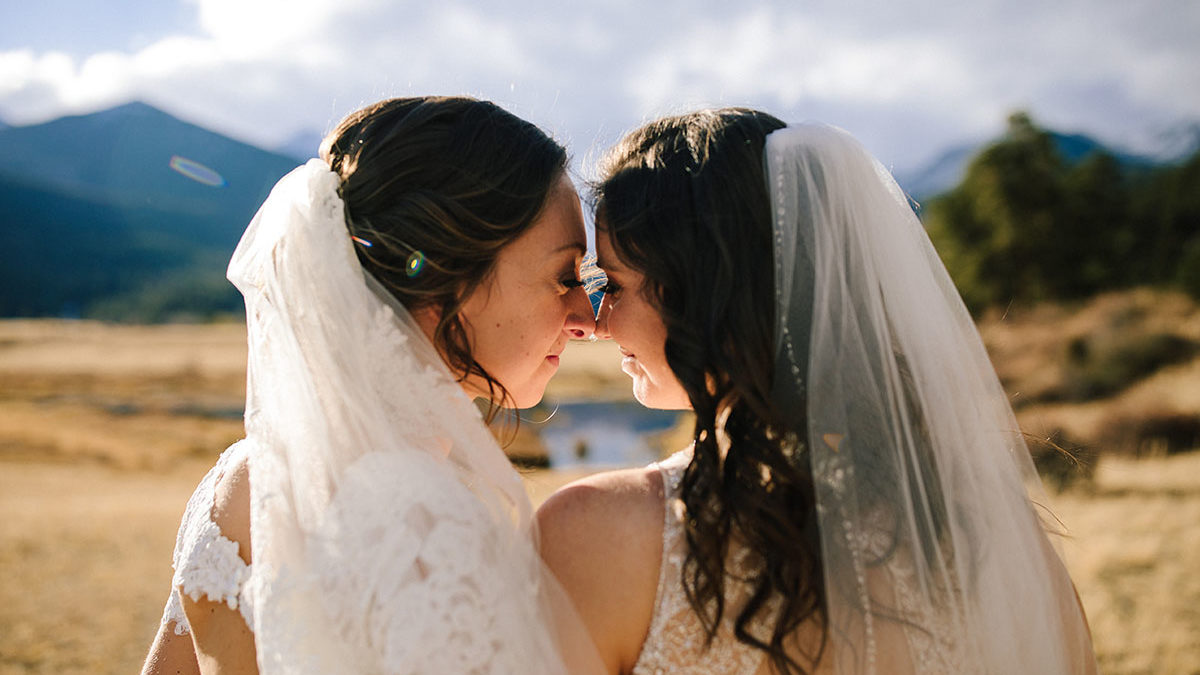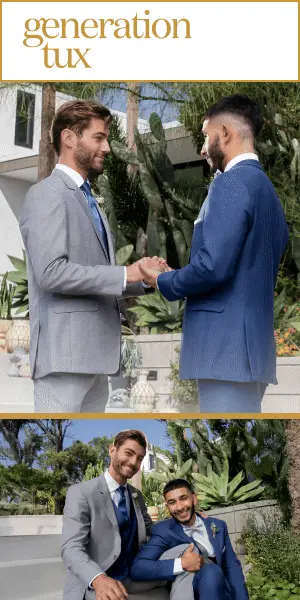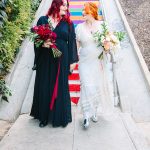Since I became an editor for Equally Wed, I’ve had the fortune of editing dozens of LGBTQ+ real weddings and engagements, interviewing couples and wedding industry professionals, attending wedding industry events and researching everything and anything weddings. I also got engaged to my partner of 10 years not long after starting at Equally Wed, and my work here has been a source of inspiration for wedding planning.
Here are five things I’ve learned about LGBTQ+ weddings in my work at Equally Wed.
It helps a lot when vendors are inclusive and actively pro-LGBTQ.
Many couples face vendors who have gendered language on their forms and various aspects of their business, like “bride and groom” or “his and hers.” It makes a difference when vendors go out of their way to showcase that they’re LGBTQ-friendly by doing things like updating their forms, including LGBTQ+ couples in their advertisements or social media and not making any assumptions about gender or sexual orientation.
“Most vendors paperwork had ‘husband and wife,'” according to couple Ashley and Sherry, who got married in Maryland. “Everyone seemed confused as to saying bride and bride because they couldn’t tell the difference so we told them to call us Tux Bride and Dress Bride. They asked what to call my wife’s bridal party and we told them bridesmen. Simple changes can mean the world to the couple and most importantly bring you more business.”
LGBTQ+ people have all different kinds of weddings.
This should go without saying, but it sometimes feels like LGBTQ+ weddings are stereotyped—that we all have a ton of rainbow decor and completely disregard wedding traditions. The reality is that LGBTQ+ people have weddings that totally run the gamut: Intimate elopements, iconic themed weddings, stunning destination events, whimsical weddings, rainbow weddings, black tie weddings, religious weddings, weddings filled with long traditions.
When John and Stephen struggled to settle on an idea for their wedding, they asked John’s dad for advice. “And he said, ‘Well, have you guys even Googled same-sex weddings?’ It hadn’t even occurred to us because we didn’t think we were getting any other kind of married than just, you know, married like everyone does,” the couple explains.
There are myths and misconceptions about what it means to have a “same-sex wedding,” but LGBTQ+ people’s weddings are just as vibrant and varied as anyone else’s.
https://www.instagram.com/p/Bu83kSXjiMu/
Weddings are a seriously emotional time.
There’s nothing more beautiful than getting to work every day in a business that’s built on love. When I was younger, I was honestly unsure whether I’d live to see marriage equality in all 50 states (and I can only imagine how my LGBTQ+ elders felt). It’s truly incredible to tell the stories of LGBTQ+ people who are sharing their love in so many different ways.
“I don’t know if I really believe in love at first sight, but I just knew that she was going to affect my life in one way or another. I kept going back to her. I couldn’t let her go,” says Dr. Julie Shaw about her and Erica’s relationship. The two planned an epic basketball photo on the Brooklyn Bridge on the day of their wedding.
The day also goes by so fast.
My own wedding isn’t until September 2019, so I don’t know this from firsthand experience yet, but every single couple always says: Cherish your wedding day because it goes by incredibly fast.
Weddings are often events we plan for months or even years, and this can true for casual, intimate weddings and elopements as well. Occasionally a couple will—by some force of nature and dedication—plan a spur-of-the-moment wedding, but the reality is that the day still goes by so much faster than anyone expects.
What really matters is how the marriers feel about their wedding.
With LGBTQ+ weddings, there are times when family members don’t show up or aren’t supportive. They almost may be completely supportive and pro-LGBTQ+ but just have their own strict ideas about how the wedding should go.
“Up until the day of our wedding, I still had hope that my parents would show up,” explains Jaz, who got married to Abby in Kansas City, Missouri. “I continued to tell myself, ‘It will be okay. If they come, great. But if they don’t, don’t be surprised.’ I knew I only wanted them there if they support me as me. On the wedding day, they did not come.”
It can be very hard, but ultimately what matters most is that the couple getting married is happy with the wedding—that they love their food, decor, attire, flowers and venue. That they feel loved and supported by their community. That they’re pleased with however and wherever they chose to get married, whether they tied the knot with just a couple of witnesses or took their closest loved ones overseas for a destination wedding.
I’m really lucky to have the ability to work on LGBTQ+ weddings and advocate for positive, inclusive change in the wedding industry. I’m looking forward to what I learn in the next few months about weddings—both from my work and from my own summer beachside wedding.
Fin Leary
MOST VIEWED STORIES
- How to choose your wedding suit or tuxedo
- The Rise of Weddings With Long-Lasting Investments: Benefits Beyond The Big Day
- How to have a green wedding that Mother Earth would attend
- Simplify wedding communication with digital engagement announcements and thank you cards
- A Spiritual and Earthy Elopement at Lassen Volcanic National Park



























